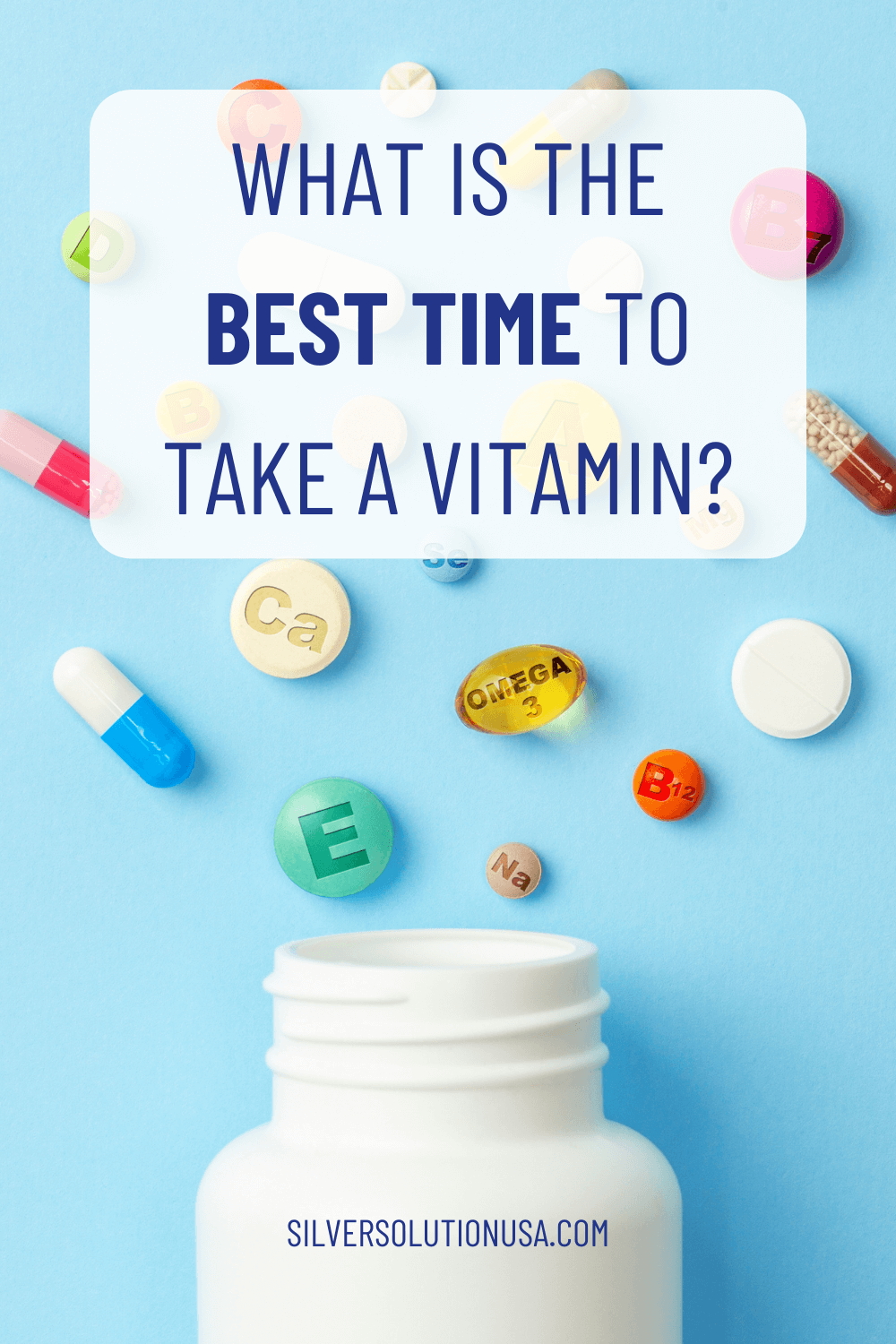What Is the Best Time to Take a Vitamin?
The world of supplements is vast, and if you’re like most people, a bit confusing and intimidating to sort through all of the information. With approximately 29,000 supplements on the market today (just in the US) and around 1,000 more added to the mix annually (also just in the US), you’d hardly be to blame. [According to the FDA]
Whether you’ve been taking supplements for years “just because” or are asking yourself whether you should be, follow our Supplement Series for an overview of the whats, whys, and whos of individual supplements. (And please read our disclaimer at the end of this post.)
Vitamins and minerals are essential to our health. In an ideal world, you’d get all your nutrients from food. Unfortunately, that’s not always possible. Stress, eating junk foods here and there, and other things get in our way. Plus, sometimes your body needs a bit of help.
Multivitamins are a quick, easy, and safe solution. Most supplements can be taken at any time during the day. But there are moments when timing matters. So is there a best time to take a vitamin? Sometimes, yes. It depends on the type of vitamin you’re taking, your own body, and more.

The best time to take a vitamin — why does timing matter?
Timing of vitamins matters for two main reasons:
- How they’re best absorbed by the body
- Their effect on your body
Some vitamins are best absorbed with water. These are called water-soluble vitamins and are usually best taken in the morning on an empty stomach. Other vitamins are fat soluble and need a little more help to be properly absorbed. These should usually be best taken with food.
In terms of their effect, certain vitamins can have an energizing effect. B vitamins are such an example. As a result, it’s better to take them in the morning to avoid side effects such as insomnia.
And since we mentioned side effects, we can’t forget that some people might get an upset stomach from taking multivitamins.
If this is you, try to identify the cause. Are you taking a new supplement on an empty stomach? Then you should probably start taking it with food. Often, switching the timing can be the solution for this adverse reaction.
When in doubt, talking to a healthcare provider could help shed some light on how to take supplements to minimize digestive issues.

Water-soluble vitamins
As you might have guessed from their name, water-soluble vitamins dissolve in water. You can take them on an empty stomach first thing in the morning if you’d like.
There are nine water-soluble vitamins:
- Vitamin C
- Vitamin B1 (thiamine)
- Vitamin B2 (riboflavin)
- Vitamin B3 (niacin)
- Vitamin B5 (pantothenic acid)
- Vitamin B6 (pyridoxine)
- Vitamin B7 (biotin)
- Vitamin B9 (folate)
- Vitamin B12 (cobalamin)
B vitamins
The B vitamin complex is known for its energizing effects, so taking them in the morning will help you feel your best throughout the day.
Water-soluble vitamins are some of the most common ones in supplements. Unlike fat-soluble ones, these vitamins are not stored in your tissues. Instead, the excess is excreted through urine.
There is evidence that B vitamins, especially vitamin B12, are best absorbed when taken on an empty stomach.
That being said, if you know you have a sensitive stomach or start experiencing digestive issues after supplementing, consider taking these vitamins with food. You can still take them in the morning, with or immediately after breakfast, to take advantage of their energizing effect.
Vitamin C
Vitamin C doesn’t have the same energizing effect, so you can take it any time of the day with or without food.
Does that mean timing doesn’t matter at all? Unfortunately, no. Timing can be very important when it comes to vitamin C.
That’s because these supplements can be highly acidic and cause gastrointestinal issues. The risks are higher if you’re already struggling with stomach issues, including gastritis or ulcers. The quick fix is to take your vitamin C with some food.

Fat-soluble vitamins
Fat-soluble vitamins include:
- Vitamin A
- Vitamin D
- Vitamin K
- Vitamin E
These supplements are best taken with foods that contain some fat. That doesn’t mean eating tons of fat each day. Drinking a small glass of whole-fat milk is enough, for instance. Even low-fat dairy can help with the absorption of fat-soluble vitamins. And if you’re vegan, half an avocado or some nuts will do the trick.
Now let’s look at the particularities of each of these vitamins.
Vitamin A
A deficiency in vitamin A, especially in the US, is rare, though not impossible. Certain people are more at risk than others. Examples include people with cystic fibrosis and those who are pregnant or breastfeeding.
Like other fat-soluble vitamins, the recommendation is to take vitamin A with or after a meal containing fat. This will promote optimal absorption and help your body get its necessary dose.
Keep in mind that excess vitamin A can come with side effects, including an increased risk of cancer, so only use it as recommended by a healthcare provider.

Vitamin D
Unlike vitamin A deficiency, vitamin D deficiency is much more common. Estimates say over 1 billion people don’t get enough vitamin D.
Since it is fat soluble, it’s best taken with or after a meal containing fat to ensure optimal absorption. A study on 50 older men concluded that vitamin D absorption was 32% better in those who took it with a meal containing fat.
If you don’t like this idea, you might be happy to know not all vitamin D supplements are created equal. For instance, vitamin D encapsulated in fatty acid spheres—also known as microsomal vitamin D—can be taken with no food.
What about the time of day? Should you take vitamin D in the morning or the evening? Studies in this area offer conflicting and often inconclusive results.
Low vitamin D levels can cause sleep issues, including insomnia or other sleep disturbances. But that doesn’t necessarily mean taking it at night will help. Simply supplementing and getting the optimal vitamin D dose each day should help sleep issues if they are caused by a nutrient deficiency.
A study on postmenopausal women conducted in 2016 linked vitamin D supplementation with poor sleep quality. It is the only study producing such results until now, but it is a sign that vitamin D is not always the synonym for good sleep.
There is also anecdotal evidence that vitamin D can interfere with melatonin production. Some say it helps you produce more melatonin and should therefore be taken in the evening. Others say it reduces it, so it should be taken in the morning. Studies are certainly conflicting on this topic, so the best thing you can do is assess how you feel.
Vitamin K
Vitamin K deficiency is rare, so you should supplement only if your doctor recommends it. Take it with a fat-containing meal for optimal absorption.
We don’t have any evidence that vitamin K is best taken in the morning or the evening, so take it whenever you wish (or when your doctor recommends it).
Vitamin E
The time of day doesn’t matter with vitamin E supplementation. However, you should try to take it with a fat-containing meal for maximum absorption.
If you forget, you might be in luck. A study conducted in 2019 showed vitamin E can still be fully absorbed as long as you eat some fat throughout the day. In other words, it’s okay to take your supplement in the morning but only eat fat later in the day.

Multivitamins
Multivitamins are a special category because they often contain a mix of both fat-soluble and water-soluble vitamins.
How you take them and when depends a lot on the brand and its recommendations. Some specifically recommend you take them in the morning. These are usually formulated to boost energy levels, so you’ll need to avoid taking them in the evening.
Others come with multiple servings, so you’ll need to spread them throughout the day. Most people find it easier to take these supplements with a meal.
All in all, it’s usually best to take multivitamins with food. That will help fat-soluble ingredients be absorbed quicker and minimize the risk of digestive issues.

The bottom line
Your body processes nutrients in different ways. You can take water-soluble vitamins on an empty stomach, while fat-soluble ones require a fat-containing meal for optimal absorption. In most cases, you can make exceptions if that helps you avoid side effects.
Multivitamins are a special case, as they contain a mix of vitamins and minerals. The safest way to use them is to take them with food to avoid digestive issues.
Did you enjoy this article or learn something new? Do you have a friend who could benefit from reading it? Share it on Facebook or any other platform you use to help spread the knowledge.

Health/Medical Disclaimer
This blog post does not provide health or medical advice. This blog post is for informational and educational purposes only and is not a substitute for professional health or medical advice. Before taking any actions based upon such information, we encourage you to consult with the appropriate medical and healthcare professionals. We do not provide any kind of health or medical advice. The use or reliance of any information contained on this blog is solely at your own risk.
Sources
https://www.ncbi.nlm.nih.gov/books/NBK538510/
https://www.ncbi.nlm.nih.gov/pmc/articles/PMC4134006/
https://www.sps.nhs.uk/wp-content/uploads/2020/06/UKMI_QA_Oral-Vitamin-B12-preparations_May-2020.pdf
https://www.ncbi.nlm.nih.gov/pmc/articles/PMC5746510/
https://pubmed.ncbi.nlm.nih.gov/30231012/
https://www.ncbi.nlm.nih.gov/pmc/articles/PMC5227980/
https://pubmed.ncbi.nlm.nih.gov/25441954/
https://www.ncbi.nlm.nih.gov/pmc/articles/PMC6631968/
https://www.ncbi.nlm.nih.gov/pmc/articles/PMC5331570/
https://www.ncbi.nlm.nih.gov/pmc/articles/PMC5118122/
https://www.ncbi.nlm.nih.gov/pmc/articles/PMC6821549/
Recent Posts
-
Are sunscreen ingredients harmful?
Sunny days can bring a lot of fun. Going out for a swim, spending time in nature, or relaxing on the …18th Mar 2024 -
The Veggie Debate: Does Cooking Vegetables Destroy Nutrients and the Best Ways to Cook Them
Vegetables are one of the healthiest foods you can choose. Some people downright hate them, while so …4th Mar 2024 -
Best Foods for COVID Recovery and Prevention
A few years ago, a new virus took the world by surprise. COVID-19 may look like the flu on the surfa …19th Feb 2024




